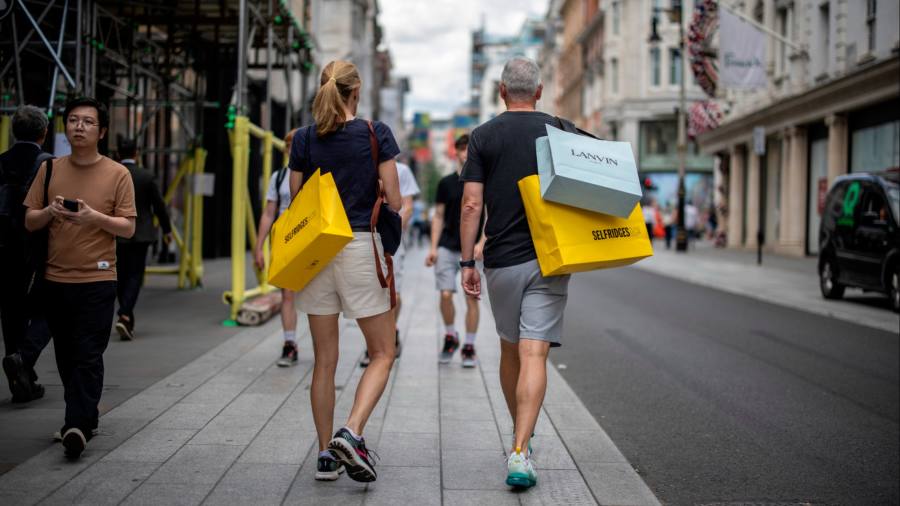Receive free UK services sector updates
We’ll send you a myFT Daily Digest email rounding up the latest UK services sector news every morning.
A quarter of UK services companies reported increasing prices charged to their customers in June, according to a closely watched survey that highlights persistent inflationary pressures in the British economy.
The Flash S&P Global / Cips UK purchasing manager index (PMI), a monthly gauge of business activity, showed that about 25 per cent of all service providers reported a rise in their output prices this month compared with May, while only 4 per cent reported a fall.
This comes as separate data from the Office for National Statistics showed unexpected resilience in consumer demand, with retail sales rising 0.3 per cent between April and May. That was a stronger reading than the 0.2 per cent contraction forecast by economists polled by Reuters.
Martin Beck, chief economic adviser to the EY Item Club, said the widespread rise in services output prices would “give the [Bank of England’s] Monetary Policy Committee reassurance that its decision to go for a 50bp rise in rates this month was justified”.
On Thursday, the BoE raised interest rates from 4.5 per cent to 5 per cent, the highest level since 2008, surprising economists who had expected a smaller increase. The bold move followed stronger than anticipated wage growth and inflation data.
June’s PMI “won’t do much to ease the Bank of England’s inflation fears, which suggests that yesterday’s interest rate rise to 5 per cent won’t be the last”, said Paul Dales, economist at Capital Economics.
Based on interviews collected between June 12 and 21 for the PMI survey, about 40 per cent of services businesses reported their costs had risen, driven by higher wages. This comes as the sector reported the fastest pace of hiring since September last year.
These figures would “concern Monetary Policy Committee, who have explicitly tied further interest rate rises to the strength of the labour market”, said Thomas Pugh, economist at consulting firm RSM UK.
The survey also showed that overall activity eased in June. The UK composite PMI index, which tracks manufacturing and services activity, declined to a three-month low of 52.8. This was below the 53.7 forecast by economists polled by Reuters, but still above the 50 mark indicating a majority of businesses reporting an expansion.
The strength of retail sales had been driven by higher spending on summer goods. ONS senior statistician Heather Bovill said online retailers did “particularly well selling outdoor goods and summer clothes, as the sun began to shine”.
She added that sales in garden centres and DIY stores had also grown as the “good weather encouraged people to start home and garden improvements”. May also saw a return to growth for fuel sales after a dip in April.
The further rebound in retail sales volumes in May suggests “the recent resilience in economic activity hasn’t yet faded”, said Ruth Gregory, economist at Capital Economics.
Other data released on Friday showed UK consumer confidence rose for the fifth consecutive month in June, to the highest level since January 2022.
The extra bank holiday for the coronation of King Charles on May 8, which has not been removed from the ONS seasonal adjustment, also played a part in May’s sales growth, according to some economists.
However, the impact of high inflation was still visible in the data. In May, shoppers spent 17 per cent more than in February 2020, the start of the coronavirus pandemic, but they bought 0.8 per cent fewer goods as the fast rise in consumer prices reduced the amount people could afford.
Gregory said that, with this week’s interest rate increase unlikely to be the last, it was “too soon to conclude the rebound in retail sales will be sustained and that the economy will avoid a recession”.
Read the full article here




